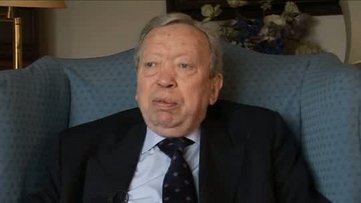NEXT STORY

Martin Amis was the golden boy from the start
RELATED STORIES

NEXT STORY

Martin Amis was the golden boy from the start
RELATED STORIES


|
Views | Duration | |
|---|---|---|---|
| 31. Tony Blair - a Tory in disguise? | 66 | 02:48 | |
| 32. Denis Healey: 'The cat that walks alone in politics' | 237 | 06:59 | |
| 33. Enoch Powell 'had the air of the fanatic' | 347 | 05:12 | |
| 34. At the end, Enoch Powell was a very unhappy fellow | 291 | 06:00 | |
| 35. The state of Britain? | 2 | 196 | 06:39 |
| 36. Protégés | 134 | 06:59 | |
| 37. You can't be an editor unless you've tried to be a writer | 32 | 02:49 | |
| 38. Martin Amis was the golden boy from the start | 187 | 04:09 | |
| 39. My appearance on Desert Island Discs was disappointing | 192 | 03:48 | |
| 40. Avoid exaggerated pronouncements | 173 | 01:21 |


But I did try and encourage people. And I was conscious, I suppose, because I wasn't a natural writer myself, that sometimes it's an agony. And I do remember that even James Fenton, who is a natural writer, who wrote the political column after Alan Watkins for me, and very well he did it, too, but he did sort of live on his nerves. And once he came to me and he said, 'Tony, I can't finish it'. I said, 'What page are you on?' He said, 'I'm on page three'. 'How far down page three?' 'About halfway'. I said, 'Okay, you come and sit at my desk, I'll finish it for you'. And I had done the job myself years ago, so I did know how to do it and I did finish it for him, which I think was the right thing to do in those circumstances, and got it to the right length and, 'That'll do. James, alright?' He said, 'Oh it's fine'. Fine, he may have said, but anyway. That, I think… I think you've got to be able to do it yourself. But I don't claim that… and with Robert Harris. I mean, Robert, who is a very, very superb natural writer, when Robert was on The Observer, he'd sometimes come to me about Friday 8 o'clock in the office in the evening and say, 'I can't do it. I can't get it together'. And I said, 'Look, Robert, doesn't matter. Don't worry. Tell you what to do: forget about it. Go home. Don't… have one drink. Go to sleep. Wake up at five, start again'. And then he'd come in with a copy in the morning at 10 o'clock, and it would be beautifully done. But he did have… he had great, sort of, nerves trouble, Robert, in those days. And you had to sort of know how to deal with that. You knew how to deal with that if you'd been through it yourself.
So I don't think you can do it if you haven't been through it. As I say, when I used to write the New Statesman column for John Freeman, it always had to be in by sort of 12 o'clock on Wednesdays. And at first, I used to come home on Tuesday night at 6 o'clock, full of nerves and collywobbles and nervous and tummy ache and stuff, sit at the desk and try and write it. And I didn't have great success, so I then changed the routine, and I think it worked better, that I used to sort of think about it, but I'd go to bed early on Tuesday evenings, I'd get up 6 in the morning, and start to sort of write the first page at home, and then I'd write the rest in the office, get it done by 12. It worked better for me than the Tuesday night stand, which really did, sort of, take it out of me, and I was then like a wet rag in the morning, too.
So I think if you've done it, and I don't think you probably can be an editor unless you've tried to be a writer, because a lot of journalists must deal with writing, and you've got to have been through the mangle yourself, and that means you understand what people are going through. But I don't really claim that I had great qualities of sympathy. Some people would say I had very little. But I did try. And I think you have to be able to say, look, it's not the end of the world, but let's get it right. And on the whole, if you persist, you do succeed in getting it right.
A distinguished British political observer, Anthony Howard (1934-2010) wrote for 'The Guardian', 'The Sunday Times' and 'The Observer' for over 40 years, during which time he has commented on the historical significance of global political issues. He was also editor of 'The Listener' and 'The New Statesman', and a reporter on both 'Newsnight' and 'Panorama'. He was awarded the CBE in 1997.
Title: You can't be an editor unless you've tried to be a writer
Listeners: Christopher Sykes
Christopher Sykes is a London-based television producer and director who has made a number of documentary films for BBC TV, Channel 4 and PBS.
Tags: journalism, work life, writing
Duration: 2 minutes, 49 seconds
Date story recorded: November - December 2008
Date story went live: 21 May 2018